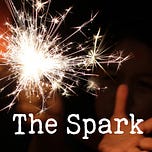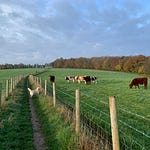After eight years of research and writing, everything has snowballed in the most wonderful way. Find out more after the author interview, reading recs, and writing resources!
📖 Author interview with Alex Pickett
Alex Pickett grew up in Wisconsin. He received his MFA from the University of Florida.
His debut novel, The Restaurant Inspector, was published in 2021. His short story collection, Camera Lake, was published this year. His stories have appeared in literary journals such as The Southern Review and Subtropics. The Restaurant Inspector was selected as the Wisconsin Public Radio "Book of the Month" in May 2024.
But he has had to work to live. He was an inspector in New York City and supervised a warehouse in Fairbanks, Alaska. He has worked at two cemeteries and four factories. He has been a movie extra, a researcher, a copywriter, and a winter caretaker at Denali State Park. He also managed a London homeless shelter and taught creative writing to undocumented refugees and asylum seekers for the British Red Cross.
Currently, he is a doctoral researcher at the University of Westminster and teaches creative writing at City Lit in London. He just got a dog named Maxine.
What inspires you?
Being able to sit down tomorrow and write fiction.
Do you have a writing routine?
Do I ever. I eat the same breakfast every day. Oatmeal, coffee, smoothie. The muscle memory of preparation allows my mind to ease into the day. After breakfast I drink coffee and read. I used to read fiction during coffee time. But I began to notice the style of what I read seeping too much into my own writing. Sitting down to write is scary. The words might not come. When motivation strikes, I force myself to the computer. I write or edit for three to five hours, eat lunch, and then go back to work. But usually not writing work. Emails, editing, answering these questions, that kind of thing. Every day that I am able to adhere to this routine is a gift.
Writing’s biggest secret is…
I wish I knew! Well, I’ll say this. Don’t stop. Keep going. Figure some stuff out. Fail. Get used to failing. Figure more stuff out. Keep writing. Enjoy writing. Writing is difficult. Is that the secret? Writing is difficult? Or, revised: Writing is difficult but worth the heartache.
My worst writing moment
How to choose from all the rejection! Fine, I’ll do a workshop story. Padgett Powell, a wonderful writer, concluded my workshop by saying, “If this is the story that Mr. Pickett wanted to write, then he has done it.” I had played it safe. I did not risk failure. I knew what I was doing. I still regret it. I don’t want to be that person. But I was that day.
My best writing moment
I’ll interpret “moment” loosely. I stopped writing for a few years after university. I had nothing to write about. Plus, I was able to sacrifice writing from my life. Then, one summer, I think it was 2010, I decided I would write. That was it. I decided to. I had a horrible apartment with no bed. I slept on the floor, wrapped in a quilt, surrounded by books. I worked at a cemetery. Every free moment I wrote. I sat at a glass-topped table that came with the apartment and typed on a netbook. I had no internet access. A flip pay-as-you-go phone. I read short story anthologies and anything by a Russian. I had two stories in mind and spent the summer obsessing about them. It was so hot. I had no air conditioning. Incredible.
What are you reading right now?
Time Shelter by Georgi Gospodinov. It’s great.
Book recommendation
The Quick & the Dead by Joy Williams? Or Oreo by Fran Ross? The Dog of the South by Charles Portis? Horse Crazy by Gary Indiana? Those are all near-perfect books, but I feel I should be imperfect and recommend a deeper cut. How about Memories of Amnesia by Lawrence Shainberg. Yes, that. It’s about a brain surgeon who realizes he has brain damage while performing brain surgery, then describes his ailment in meticulous detail as both practitioner and patient. It’s wild. The novel I am writing for my PhD involves memory loss. If anyone has any amnesia or memory loss fiction recs, please get in touch.
Where can we find you?
My website is rapickett.com and Twitter is @alex_pickett1.
📚 Recommendations for ravenous readers
I thoroughly enjoyed Alex Pickett’s short story class at City Lit last autumn. Fittingly, I also love his short story collection, Camera Lake, as well as his novel, The Restaurant Inspector, which is told masterfully from many points of view. His characters are unforgettably unique, and he weaves together tragedy and humor in his plotlines.
Speaking of short story collections, Jhumpa Lahiri’s Interpreter of Maladies tells nine stories set in the 1980s and 1990s of Indians, Americans, and Indian Americans. Full of subtle observations and sensory details, Lahiri explores personal relationships as well as wider cultural expectations and clashes. It’s the closest comparative title I’ve found for my own short story collection (I say humbly, noting that it won the 2000 Pulitzer Prize for Fiction).
In my exploration of dual timelines and historical fiction, I read The Alice Network by Kate Quinn. The novel incorporates elements of mystery, suspense, and thrillers. I’d categorize it as “upmarket” or “book club” since it balances character development and gorgeous (yet non-gratuitous) language with the fast-paced plot. In 1947, Charlie St. Clair is investigating her cousin’s disappearance in France, aided by Eve Gardiner. In 1915, during the Great War, Eve is a spy in France. As the search for the cousin unfurls, the women discover that one man lies behind their suffering.
✏️ Resources for wonderful writers
(Or, The Tale of Two Jessicas)
Save the Cat! Writes a Novel is a classic book for plotters. Jessica Brody takes 15 essential plot points from screenwriting and adapts them to novels. It’s a helpful way to structure your three-act plot.
Jessica Payne, The Spark’s featured author last month, has written a super-useful post, ”A How-To Guide: from Pantser to Plantser Pt 1,” in her Substack, The Payneful Truth About Being a Writer. I’ve even printed it out for easy reference. In this guide, she mentions both Lisa Cron’s Story Genius and Save the Cat! Writes a Novel. I’m excited to use her approach to map out my first full novel.
👣 Updates on my moseying
So: the snowball effect. I started researching and writing about my family in January, 2017. From the summer of 2023, I started querying agents and in August, my query letter and first five pages were critiqued on The Shit No One Tells You About Writing podcast. After a few months, with some feedback from agents, I decided to rework the manuscript. Around that time, in autumn 2023, I began submitting to contests and literary magazines. Fast forward a few months to spring 2024, and two stories got long-listed in Flash 500 Short Stories 2024, and another story was featured on The Failing Writers’ Podcast.
Then, the game-changer in June: getting shortlisted for The Hope Prize, with the anthology published by Simon & Schuster Australia and all royalties going to mental health charity Beyond Blue. Next was another shortlist, for the Oxford Flash Fiction Prize, and an opportunity to read at the Weston Library (part of Oxford University’s Bodleian Libraries) at the anthology launch in October. And, most recently, with a super-fast turnaround, was the placement of another story in Livina Press Issue 10 with the “Golden” theme.
So now I have three printed publications on “my shelf” and the unbelievable thing is that they were all being printed around the same time—mid-October—in Australia, the U.K. and the U.S.! 📚 🇦🇺 📚 🇬🇧 📚 🇺🇸
Queries to literary agents — tracked on QueryTracker 📊
⏱️ 10 pending (7 🇺🇸, 3 🇬🇧)
Writing submissions — tracked on Chill Subs 📊
🏆 7 accepted
⏱️ 6 pending
🙅♀️ 7 withdrawn (accepted elsewhere)
🚫 45 rejected
🟰 65 total
Most book links go to my Bookshop.org page, where sales are win-win-win, benefiting the authors, local bookstores, and my own writing—unlike using A-you-know-who!
If you enjoy The Spark, please share it, rate, and review on your favorite podcast platform or go to Substack where you can listen to the podcast and subscribe to the newsletter.

















Share this post